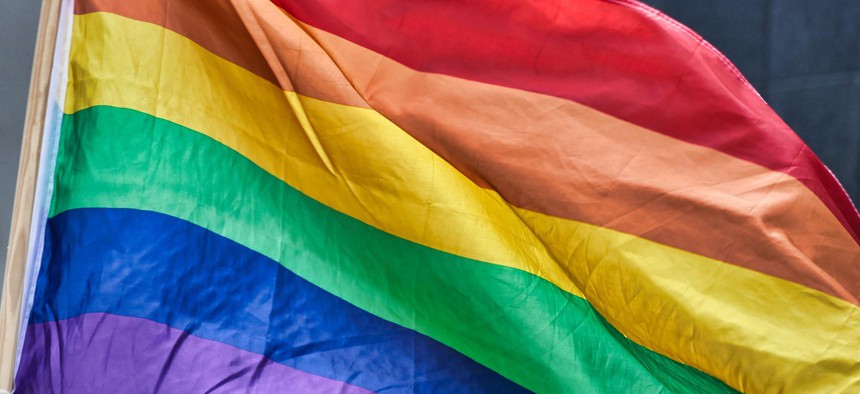Florida wasn't the only state that passed LGBTQ-related laws this year
There’s been a wave of legislation that affects the LGBTQ community, including some directed at transgender youth.

Image by SatyaPrem from Pixabay
The Sunshine State wasn't alone in moving high-profile legislation that raised the ire of the LGBTQ community and its allies.
Legislators in 13 states passed laws this year that affect LGBTQ residents, according to a national gay rights advocacy group, including a measure in Alabama that its state policy director called “the most anti-transgender legislative package we have ever seen.”
Much of the surge of anti-LGBTQ bills nationwide was directed at restricting services to transgender youth, by restricting their ability to participate in youth sports, use gender-appropriate restrooms or get appropriate medical care.
“Our community has been under attack,” said Cathryn Oakley, senior counsel and state legislative director for the Human Rights Campaign. “Radical political forces … are using the power that they are clinging onto to take decisions away from parents who want what’s best for their families. [It] is truly cowardly and unconscionable.”
The Alabama bill was especially sweeping. It banned transgender students from using a restroom corresponding with their gender identity. It requires school administrators to inform a student’s parents if they identify as LGBTQ. It makes it a crime to provide gender-affirming medical care to transgender youth. And it restricts what teachers can instruct their students on regarding sexual orientation and gender identity.
Alabama Gov. Kay Ivey, a Republican, signed the measure. “There are very real challenges facing our young people, especially with today’s societal pressures and modern culture,” she said in a statement. “I believe very strongly that if the Good Lord made you a boy, you are a boy, and if he made you a girl, you are a girl.”
The Human Rights Campaign counted 24 laws aimed at the LGBTQ community that made it onto the books so far this year. That’s a small fraction of the 240 or more anti-LGBTQ bills that were introduced or moving this year in state capitals across the country, but Oakley said a 90% success rate in blocking those bills “does not feel very good” because the ones that do make into law “are painful and they stick with us.”
Several state legislatures are still in session, so the numbers could change by the end of the year, but most state lawmakers have wrapped up official business.
The tally comes at a fraught time for LGBTQ people and advocates. Many communities are celebrating with Pride parades and festivities during June, but the wave of anti-LGBTQ laws and rhetoric has added extra anxiety to those activities. Idaho police arrested 31 members of a white supremacist group near a Pride event in Coeur d’Alene, Idaho last weekend for conspiring to riot.
Meantime, a group of men wearing outfits of the Proud Boys far-right hate group interrupted a preschool story hour led by drag queen Panda Dulce. The men shouted slurs at Dulce but left before sheriff’s deputies arrived.
Oakley said that negative remarks by state officials helped create the treacherous situation. She noted that Florida Gov. Ron DeSantis’s spokesperson claimed that anyone who didn’t support that state's Parental Rights in Education law, mocked by critics as “Don’t Say Gay,” was “probably a groomer.”
“The absolutely extreme, egregious, homophobic transphobic rhetoric that we’ve heard from elected officials [and the fact] that they felt free to do that, that they thought it would be persuasive, that they didn’t care who they offended with that kind of rhetoric, I do think that … gives permission to folks who are interested in doing harm and doing violence,” Oakley said.
Most-watched law was in Florida
Florida’s measure, which limits school instruction about gender and sexuality and eventually pit Republican lawmakers against the Walt Disney Co., was one of the most-watched battles over gay rights in the country this year. Like the many Republican-led efforts to limit the teaching of the role of race in American history and society, the law (HB 1557) has stirred up confrontations over what gets taught in school and who should decide that.
“We will make sure that parents can send their kids to school to get an education, not an indoctrination,” DeSantis said when he signed the measure in March.
The law prohibits classroom instruction on sexual orientation or gender orientation between kindergarten and third grade, or in a manner that is “not age-appropriate or developmentally appropriate” for older students. Under the law, parents can sue school districts if they feel the policy is violated.
During this year's regular legislative session, Florida House Speaker Chris Sprowls, a Palm Harbor Republican, blamed the news media for creating confusion over the bill, saying the measure empowers parents to be involved in conversations about their students' sexual identity.
"I would say the media as a whole on this bill has totally misreported the facts," he said, according to a USA Today Network-Florida story. "So when you say, 'Well, gosh, it's created angst,' you have to own some of that angst. You've got to own the angst because the reality is they think that and feel that way because of what they read, not what is in the bill."
Oakley said teachers’ entire job is to teach materials that are age-appropriate for their students. The law, she said, creates “another mechanism for harassment.”
“A teacher is not going to be able to rely on their own judgment or on the judgment of their principal or school district. They are not going to be able to rely on what they’ve learned in their licensing,” she said. “They are going to have to teach in such a way that the most conservative, most litigious, most homophobic, transphobic parent in their class is not going to sue the school.”
Oakley said the bill is based on faulty premises. “It’s as if only LGBTQ people have a sexuality,” she said. “Everyone has a sexual orientation. Everyone has a gender identity. … But the only people who are going to be targeted by this legislation are people who are LGBTQ or who are perceived to be LGBTQ.”
The HRC noted that other curriculum restrictions passed in Alabama, Florida, Georgia and South Dakota, too.
The HRC flagged an Oklahoma measure that prohibits birth certificates from using any sex designation other than male or female. An Arizona law to allow adoption providers to discriminate on the basis of religious beliefs made the list, because HRC said it allows those agencies to discriminate against LGBTQ parents.
The 13 states listed in the report are Alabama, Arizona, Florida, Georgia, Indiana, Iowa, Kentucky, Louisiana, Oklahoma, South Carolina, South Dakota, Tennessee and Utah.
A version of this story previously appeared on Route Fifty.
NEXT STORY: Vacationers to Florida & elsewhere plan to visit beaches, lakes, parks this summer
